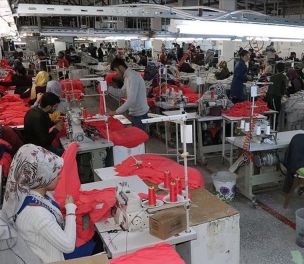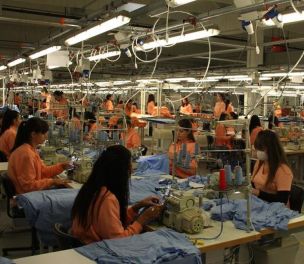Fotoğraf: ILO Asia-Pacific / Flickr
Click to read the article in Turkish
Nearly 70 percent of workers have a salary enough to meet their needs for less than one month, according to a survey by Genel-İş, a union affiliated with the Confederation of Progressive Trade Unions of Turkey (DİSK).
The union conducted a survey among 1,308 of its member workers to assess the impact of the pandemic on them.
While 69.8 percent said they could make ends meet only for one month with their salaries and they don't have any other source of income or savings, 23.8 percent said they could meet their needs for up to three months.
When asked about their monthly income, 60.1 percent said they earn between the minimum salary (2,324 lira) and 3,500 lira, 15.9 percent said between 3,501 lira and 4,000 lira, 14 percent said between 4,001 and 5,000 lira, 10 percent said more than 5,000 lira and 6.7 percent said they were minimum salary earners (1 US dollar = 7.51 Turkish lira).
Among the participants, 81.9 percent said they received a full salary in May.
88.8 percent of the workers said they did not receive any assistance from the Turkish Employment Agency (İŞKUR) while 9.3 said they received a short time work allowance.
Because the cuts from the salaries of union workers were low, the number of applications to the İŞKUR was low, the union noted.
After the coronavirus outbreak started in mid-March, the government banned layoffs and introduced the short time work allowance and unpaid leave allowance for employees.
The short time work allowance amounts to 60 percent of the employee's gross earnings and the unpaid leave allowance is 39 lira (5.19 dollars) for one day.
Workers prefer cheaper food as their debts increase
About the impact of the pandemic on their economic situation, 57.1 percent of the workers said, "I have had various difficulties in the period of the pandemic" while 39.6 percent said they didn't have a loss of income.
As for debts, 21.3 percent of the workers said they were not able to pay their credit card debt or they could only make the minimum payment, 14.3 percent said their debt had increased, 9.4 percent said they had difficulties paying their bills.
During the pandemic, 42 percent of the workers buy cheaper food than normal, according to the survey. While 32.9 percent said there were no changes in their food purchase, 21.7 percent said they preferred healthier food.
Short time work and unpaid leave
When workers were asked, "When you consider the March 2020 and June 2020 period, how has your way of working changed?" 49.8 percent said their way of working was not changed while 21.8 said they had an alternating work schedule, 11 percent said they switched to short time work, 6.2 percent said they were put on paid leave and 5.3 percent said they worked from home.
The reason for the relatively low rate in the change was that municipal services continued during the pandemic, the union noted.
As for working time, 35.4 percent said it reduced, 47.9 percent said it did not change and 13.8 percent said it increased.
Covid-19 infections
Among the participants, 73.6 percent said they were not infected with Covid-19, 25.5 percent said their colleagues were infected, 0.4 percent said they were infected.
Most infections were found in cleaning work, municipal police, parks-gardens and administrative-financial services.
After a Covid-19 case was found, 7.5 percent of the participants said "the production stopped, the department of the infected worker quarantined and other departments continued working" while 2.5 percent said, "Production stopped, the employer stopped the work."
21.4 percent said the production did not stop despite Covid-19 cases and 1.1 percent said they exercised their right to avoid working based on Article 13 of Law No. 6331.
As for Covid-19 measures, 35.3 percent of the union members said precautionary measures in their workplace were insufficient and 27.2 percent said they were "neither sufficient nor insufficient."
A Covid-19 case was not found in 63.2 percent of the workplaces. (HA/VK)





aa.jpg)



